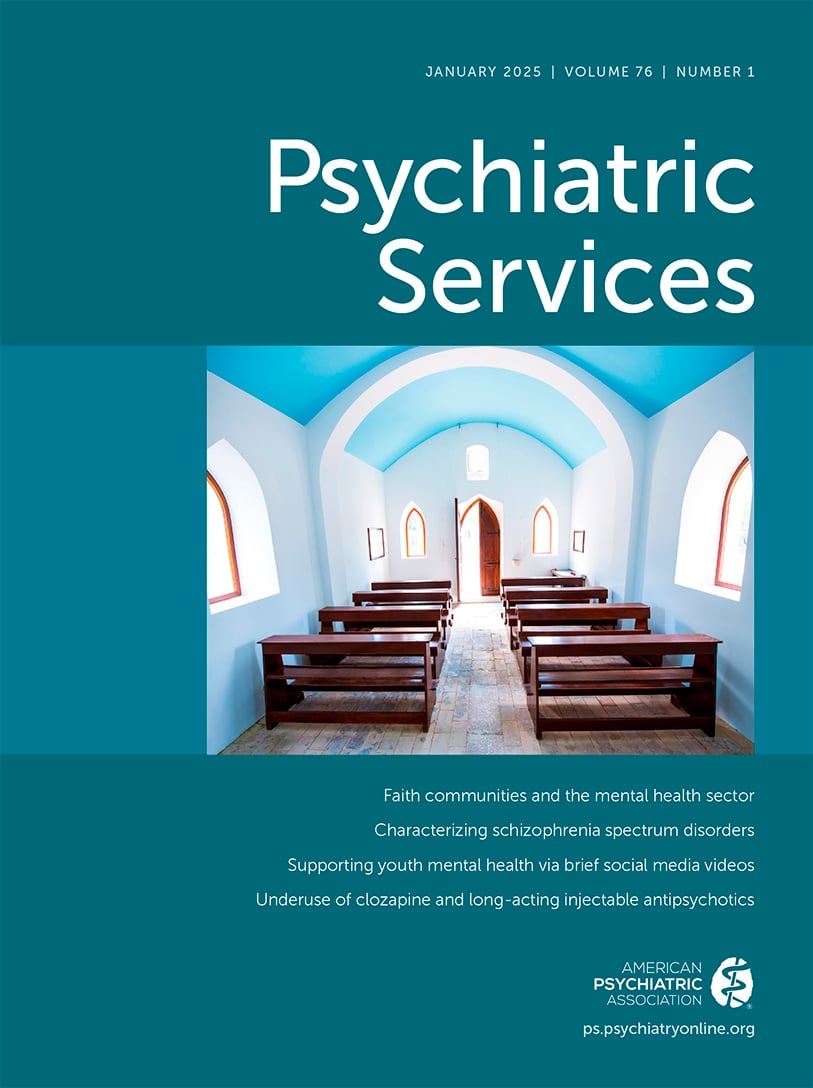Psychiatric Services
- Volume 35
- Number 8
- August 1984
Article
Publication date: 01 August 1984
Pages767–768Introduction from Dr. Alger: This new column will focus on audiovisual materials, empbasizing videotapes but also covering films and other media. The critical emphasis will be on teaching, and on the ways in which various media programs may be effectively ...
https://doi.org/10.1176/ps.35.8.767Publication date: 01 August 1984
Pages785–793Three major cycles of reform in public mental health care—the moral treatment, mental hygiene, and community mental health movements—are described as a basis for assessing current fiscal policies in the mental health field. The authors argue that the ...
https://doi.org/10.1176/ps.35.8.785Publication date: 01 August 1984
Pages793–797The psychoeducational approach to psychiatric illness addresses the need for better information about mental illness and its treatment for the patient and family. Most programs focus on the family and its involvement with the patient; in a social ...
https://doi.org/10.1176/ps.35.8.793Publication date: 01 August 1984
Pages798–802Deinstitutionalization of the chronically mentally ill does not mean they no longer need social support, protection, and relief from the pressures of life—in other words, asylum and sanctuary. The authors address the questions of why asylum should be ...
https://doi.org/10.1176/ps.35.8.798Publication date: 01 August 1984
Pages802–805The authors describe a therapeutic approach to the pharmacologic treatment of the schizophrenic patient. This team approach relies on interaction between the patient, the patient's family, and the clinician, and helps to eliminate blaming behavior that ...
https://doi.org/10.1176/ps.35.8.802Publication date: 01 August 1984
Pages805–808Staff who work with chronic mental patients are often frustrated by the patients' seeming failure to improve. However, a review of problem cases at a public mental hospital helped staff to realize that several patients had made incremental progress over a ...
https://doi.org/10.1176/ps.35.8.805Publication date: 01 August 1984
Pages809–812The author, who was diagnosed as having chronic process schizopbrenia, describes hen expeniences as a patient in the treatment world of the chronic mentally ill, beginning at age 17· Over the next six years she was seen by four psychiatrists, was ...
https://doi.org/10.1176/ps.35.8.809Publication date: 01 August 1984
Pages813–820The author reviews advances in the sociological perspective on mental health over the past four years. He examines neseanch on such topics as community acceptance of the mentally ill, arrest rates among former psychiatric inpatients, and the effect of ...
https://doi.org/10.1176/ps.35.8.813Publication date: 01 August 1984
Pages820–823The authors reviewed the family histories of 156 patients in an affective disorders program and identified two groups of affective disorders. Group 1 consisted of bipolar illness and majon depression, with high familial incience of affective disorder and ...
https://doi.org/10.1176/ps.35.8.820Publication date: 01 August 1984
Pages823–827In 1972 the Brecksville Unit of the Cleveland Veterans Administnation Medical Center began the first inpatient treatment program for pathological gambling in the United States. The 30-day, highly structured gambling treatment program aims for abstinence ...
https://doi.org/10.1176/ps.35.8.823Past Issues
View Issues Archive
Vol. 76 | No. 1

Vol. 75 | No. 12

Vol. 75 | No. 11
